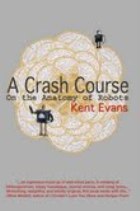
Who comes up with these titles anyway?
By Kent Evans, author of A Crash Course on the Anatomy of Robots
Writing fiction based on personal experience, or taking liberties when writing in an autobiographical format is nothing new. From Dante to Vonnegut, to Miller and Thomson, there have been Kilgore Trout’s since literature began. Concurrently, there has always been the tendency to try and link these works and their authors. Who hasn’t wondered what goes on in Stephen King’s head? Now, we have labels that actually encourage it.
This can be fun. It takes readers into new Meta levels of interpretation. When I was young and broke in Paris, I loved comparing Miller and Nin’s works and finding their references to one another. In my new novel, Crash Course, I have a protagonist who is a traveler and poet, as well as a narrator that is a fictional version of me. Both refer to fictionalized events that could be interpreted as parts of my life and they refer back onto the book itself – Meta to infinity and so on. Especially in today’s society, where you can Wiki and Google pretty much anything, there is a sort of insider giddiness in the ability to connect the dots and speculate. Is Bill Murray actually playing Harrison Ford in Lost in Translation? Was Hunter S. Thomson really so nuts?
This all adds an exciting level of interaction, speculation, (and frankly interest and sales) that has never existed before. However, for the author this can backfire.
In the case of Fictional Memoir, if you don’t explicitly state that certain events have been changed or altered for dramatic effect you may be accused more or less of lying (James Frey anyone?). In Confessional Literature, which probably describes me a bit better, you also run the risk of the opposite. Reviewers, readers, fans, and detractors will all assume that you are just like the cipher you have created, and if they don’t like him or her (or conversely if they do), you are now open to receive whatever feelings they have toward a fictional character.
My most common headache when I meet someone who has my read or heard my work is them, almost always in a good natured way, giving me the conversational equivalent of a wink wink, nudge nudge. My ex got perpetually sick of being confused with the girl at the end of my last book. This was so much so that as she soon as she recognized that particularly knowing grin she just rolled her eyes and walked away. Once I had a professor at an unnamed Texas University come up and talk to me in an overly familiar manner that took me aback. It took me a second to gain my composure and realize I did not know him personally and he was addressing me as the narrator of Malas Ondas.
To be fair that book was a travel memoir. But how can you think that you actually know someone based on 200 pages of a poetry laden exposition covering 4 months of their life? Maybe Tucker Max truly is the asshole he’d have us all believe, but I seriously doubt it. Books are molded and sold in a certain way and that is of course to sell books – not to provide accurate insights into the souls of their makers.
So as a writer, how do you handle this? Let’s be honest, it’s not just those of us who have explicitly had our work described as autobiographical that are vulnerable to this. There is an assumption that people write about what they know (i.e. live). Even if you’re writing Fantasy/Sci-Fi people will assume you’re creating metaphor out your own life experience.
Well the first thing I would say is, accept on some very real level, that it’s true. If it isn’t then you’re just writing literary exercises, devoid of your personality and soul. Leave that to the scripter for the next giant battling robots movie.
Second, accept on some level that this is what you want. Whether you’re holed up in a cabin writing the next great American novel, searching for a publisher to share your stories, commenting on the mess of the current world, or simply making sense of the ideas in your head – on several levels you are making the individual choice to interact.
The joy of any art (or pain for you tortured soul types) is the very personal representation of yourself in a transformative medium. Whether you’re an Ex-Marine that draws watercolors or an accountant that writes children’s books, we are all trying to create something out of nothing. We conjure physical ideas out of warm or cold corners of our depths to share with people we will probably never meet. Why: in most cases, the hopes for a reaction. Good or bad, what we intended or not, writing comes from a desire to connect. Even if the work is wildly personal, or created for selfish or self-serving purposes, we still search for that connection.
Perhaps, right now, you are reading that last bit and thinking that it’s just my opinion on the matter. Perhaps you agree, or vehemently disagree. Maybe you think you know a bit about me and would like to shake my hand or bitch-slap me.
That, my dear friends, is exactly the point.
 Kent Evans is a traveler, poet and musician. He is the author of” Malas Ondas: Lime, Sand, Sex, and Salsa in the Land of Conquistadors” and the upcoming novel “A Crash Course on the Anatomy of Robots” from Pangea Books as well as the Original Soundtrack available on iTunes and certain electronic versions of the book.
Kent Evans is a traveler, poet and musician. He is the author of” Malas Ondas: Lime, Sand, Sex, and Salsa in the Land of Conquistadors” and the upcoming novel “A Crash Course on the Anatomy of Robots” from Pangea Books as well as the Original Soundtrack available on iTunes and certain electronic versions of the book.
